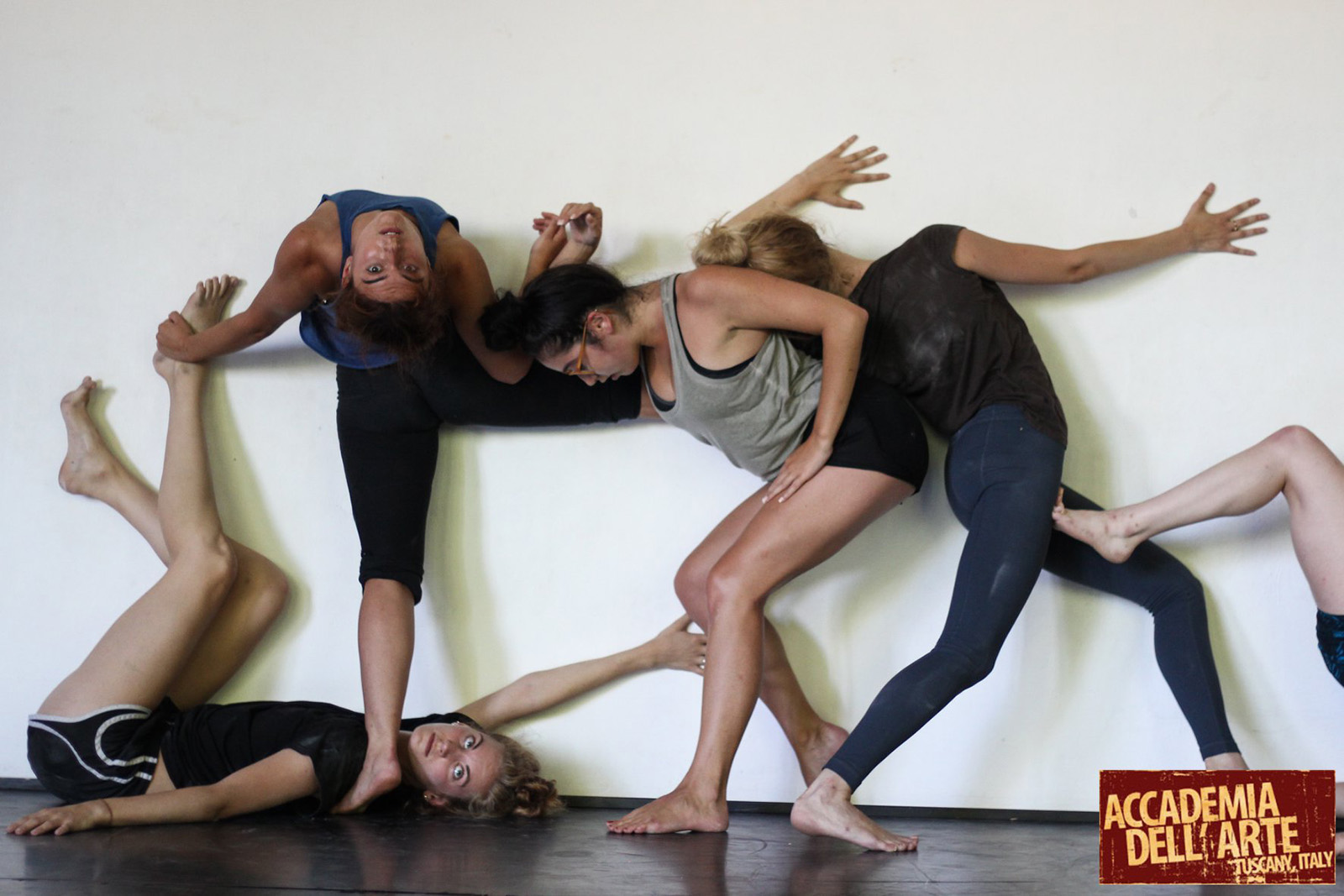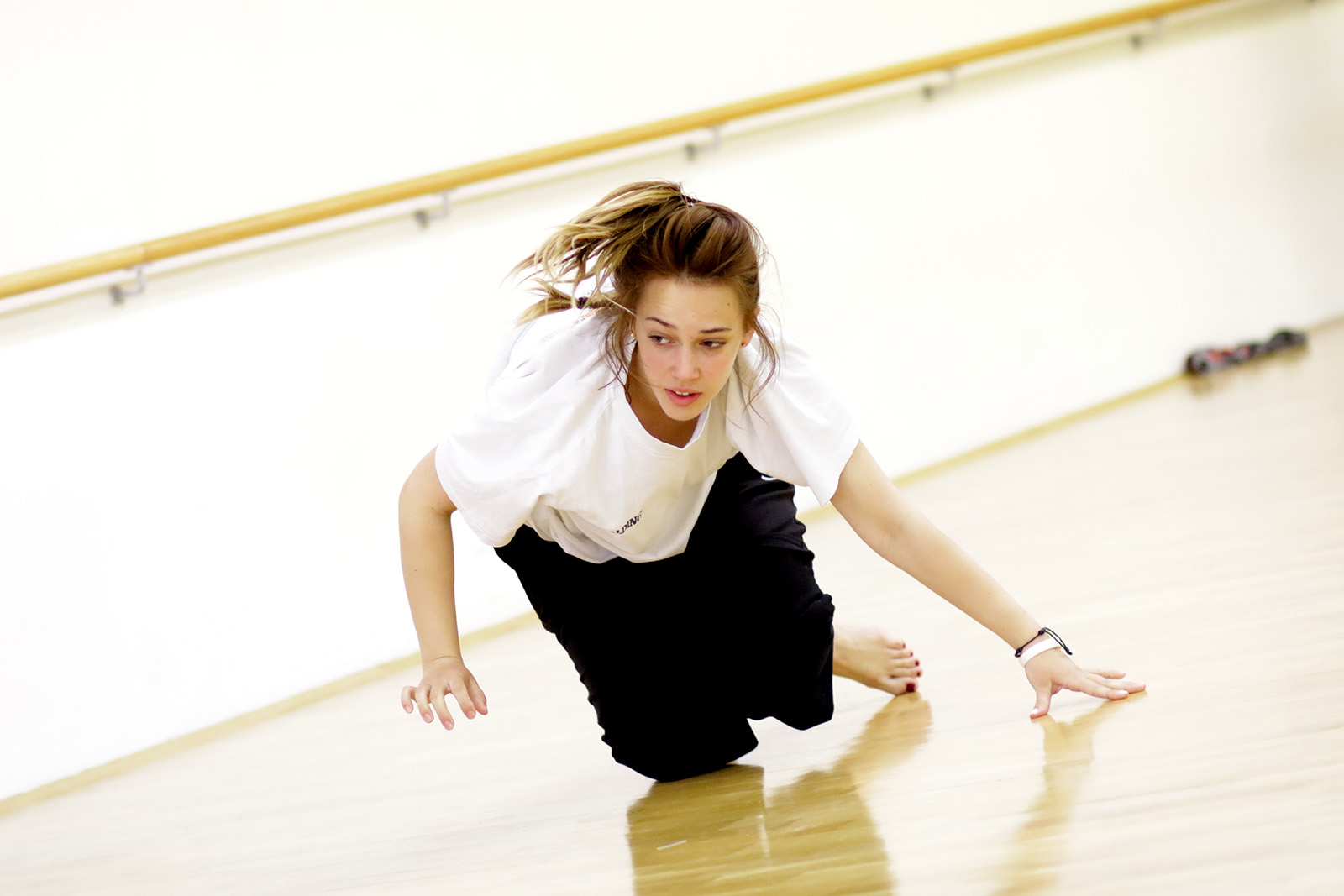SoPoučevanje /
CoTeaching



Foto: Sunčan Stone, Academia dell’Arte
(Slo)
SoPoučevanje je izobraževalni format v katerem dva, trije ali več pedagogov so-poučuje isti plesni trening ali delavnico. Format razvijamo člani mreže Nomad Dance Academy in drugi povabljeni pedagogi.
SoPoučevanje odpira izobraževalni proces preko ustvarjanja varnega okolja poučevanja/učenja, kjer prenos znanja ter plesna in teoretska praksa potekajo v prijateljskem tonu.
Pravila SoPoučevanja so določena preko score-a (koreografske partiture), ki se prilagaja specifični situaciji, študentom in nalogi, ki smo si jo zadali. Score lahko vsebuje cilj treninga, čas, število učiteljev ter druge informacije, ki omogočajo jasno, a hkrati igrivo situacijo.
Elemente plesne prakse in teorije v tem formatu spajamo in jih ne delimo. S tem namenom so-poučujejo tako plesni pedagogi kakor plesni teoretiki.
Samo ime formata predlaga sobivanje idej, metod poučevanja ter pogledov na to, kaj sodobni ples je. Sodelovanje v CoTeachingu od udeležencev zahteva odprtost do preskušanja novega, možnost napake in deljenja znanja. Učiteljem omogoča sopostaviti svojo pedagoško prakso z drugimi pedagogi ter omogoča takojšen odziv.
Jedro pedagogov sestavljamo člani Nomad Dance Academy: Dragana Alfirević, Gisela Müller, Rok Vevar, Gregor Kamnikar in Dejan Srhoj. V obdobju 2020–2022 se nam bodo pridružili še pedagogi s šole CodArts iz Rotterdama ter pedagogi SVŠGUGL v Ljubljani. Proces nameravamo skleniti z dvema konferencama o novih formatih poučevanja. Ena v Ljubljani in druga v Rotterdamu.
CoTeaching format izvajamo od leta 2012, z njim smo gostovali v srednjih šolah, akademijah in na odprtih delavnicah v Sloveniji, Hrvaški, Srbiji, Makedoniji, Bolgariji in Italiji.
So-poučevanje svoje naloge, vaje in znanja zajema iz širokega nabora različnih plesnih tehnik, praks, hibridov in pedagoških iger in jih oblikuje v naslednje module:
(a) ludus (ples skozi teorijo iger),
(b) živa plesna zgodovina – zgodovina plesnega studia,
(c) telesa in njegove politike,
(d) zgodovina in kultura telesne izkušnje,
(e) tek skozi principe plesne kompozicije,
(f) telo kot krajina in klima,
(g) zgodovina telesna vertikalnosti in horizontalnosti v plesu.
Vsakokraten kolektiv so-poučevalcev si želi, da študentje učne situacije zapustijo z razumevanjem: da je plesni studio relacijska (medtelesna) in nehierarhična učna struktura, kolektivna in ne individualna učna izkušnja (po Rancièrovem konceptu »nevednega učitelja«), da zahteva aktivno udeležbo vseh sodelujočih, tako učiteljev kot študentov, ustvarjalen in ne produktiven (storilnosten) proces akumulacije znanj (proces je pomembnejši od učinkovitosti produkta), da je učno okolje za proces mišljenja in praktičnega dela pomembnejše kot fabrikacija vednostnega prenosa, da je znanje skupna (skupnostna) in ne zasebna stvar, da (plesna) umetnost, njena proizvodnja in ustvarjanje stvar vseh tistih dobrih reči, ki se jih nikoli ne more do konca izmeriti (kvaliteta namesto kvantitete, razvoj namesto rasti).
SoPoučevanje odpira izobraževalni proces preko ustvarjanja varnega okolja poučevanja/učenja, kjer prenos znanja ter plesna in teoretska praksa potekajo v prijateljskem tonu.
Pravila SoPoučevanja so določena preko score-a (koreografske partiture), ki se prilagaja specifični situaciji, študentom in nalogi, ki smo si jo zadali. Score lahko vsebuje cilj treninga, čas, število učiteljev ter druge informacije, ki omogočajo jasno, a hkrati igrivo situacijo.
Elemente plesne prakse in teorije v tem formatu spajamo in jih ne delimo. S tem namenom so-poučujejo tako plesni pedagogi kakor plesni teoretiki.
Samo ime formata predlaga sobivanje idej, metod poučevanja ter pogledov na to, kaj sodobni ples je. Sodelovanje v CoTeachingu od udeležencev zahteva odprtost do preskušanja novega, možnost napake in deljenja znanja. Učiteljem omogoča sopostaviti svojo pedagoško prakso z drugimi pedagogi ter omogoča takojšen odziv.
Jedro pedagogov sestavljamo člani Nomad Dance Academy: Dragana Alfirević, Gisela Müller, Rok Vevar, Gregor Kamnikar in Dejan Srhoj. V obdobju 2020–2022 se nam bodo pridružili še pedagogi s šole CodArts iz Rotterdama ter pedagogi SVŠGUGL v Ljubljani. Proces nameravamo skleniti z dvema konferencama o novih formatih poučevanja. Ena v Ljubljani in druga v Rotterdamu.
CoTeaching format izvajamo od leta 2012, z njim smo gostovali v srednjih šolah, akademijah in na odprtih delavnicah v Sloveniji, Hrvaški, Srbiji, Makedoniji, Bolgariji in Italiji.
So-poučevanje svoje naloge, vaje in znanja zajema iz širokega nabora različnih plesnih tehnik, praks, hibridov in pedagoških iger in jih oblikuje v naslednje module:
(a) ludus (ples skozi teorijo iger),
(b) živa plesna zgodovina – zgodovina plesnega studia,
(c) telesa in njegove politike,
(d) zgodovina in kultura telesne izkušnje,
(e) tek skozi principe plesne kompozicije,
(f) telo kot krajina in klima,
(g) zgodovina telesna vertikalnosti in horizontalnosti v plesu.
Vsakokraten kolektiv so-poučevalcev si želi, da študentje učne situacije zapustijo z razumevanjem: da je plesni studio relacijska (medtelesna) in nehierarhična učna struktura, kolektivna in ne individualna učna izkušnja (po Rancièrovem konceptu »nevednega učitelja«), da zahteva aktivno udeležbo vseh sodelujočih, tako učiteljev kot študentov, ustvarjalen in ne produktiven (storilnosten) proces akumulacije znanj (proces je pomembnejši od učinkovitosti produkta), da je učno okolje za proces mišljenja in praktičnega dela pomembnejše kot fabrikacija vednostnega prenosa, da je znanje skupna (skupnostna) in ne zasebna stvar, da (plesna) umetnost, njena proizvodnja in ustvarjanje stvar vseh tistih dobrih reči, ki se jih nikoli ne more do konca izmeriti (kvaliteta namesto kvantitete, razvoj namesto rasti).

Foto: Sunčan Stone
(En)
CoTeaching is an educational format in which two, three, or more pedagogues co-teach the same dance training or workshop. The format is developed by the members of the NDA network and other invited guests.
CoTeaching opens the educational process by creating a safe teaching/learning environment where the transfer of knowledge as well as dance and theoretical practice are conducted in a welcoming manner.
The rules of CoTeaching are determined by a choreographic score which is adaptable to the particular situation, group of students and the task we have set ourselves. The score may include the goal of the training, time, the number of teachers, as well as other information which would facilitate a clear and at the same time playful situation.
The elements of the practice of dance and theory are connected in this format and we do not separate them. To this end, both dance pedagogues and dance theorists co-teach.
The format's name itself suggests the cohabitation of ideas, teaching methods, and perspectives on what contemporary dance is. Participation in CoTeaching requires the participants to be open-minded to new propositions, the possibility of mistakes, and the sharing of knowledge. It allows teachers to compare their teaching practice with other pedagogues and provides an immediate response.
The core team of educators consists of members of NDA: Dragana Alfirević, Gisela Müller, Rok Vevar, Gregor Kamnikar and Dejan Srhoj. In the period 2020-2022 pedagogues from CodArts (Rotterdam) and SVŠGUGL (Arts High School, Ljubljana) will join. We plan to conclude the process with two conferences on new teaching formats, one in Ljubljana and one in Rotterdam.
The CoTeaching format has been in implementation since 2012 and has been hosted in high schools, academies, and open workshops in Slovenia, Croatia, Serbia, Macedonia, Bulgaria, as well as Italy.
CoTeaching takes its assignments, exercises, and knowledge from a wide range of different dance techniques, practices, hybrids, and pedagogical games and shapes them into the following modules:
(a) Ludus (dance through game theory)
(b) Live history of dance – history of the dance studio
(c) Bodies and their politics
(d) History and culture of embodiment and physical experience
(e) A run through the principles of dance composition
(f) Body as landscape and climate
(g) History of physical verticality and horizontality in dance
Each collective of co-teachers wants students to leave the learning situation with the understanding that the dance studio is a relational (inter-bodily) and nonhierarchical learning structure; a collective rather than an individual learning experience (according to Rancière's concept of the 'ignorant schoolmaster'); that it requires the active participation of all involved, teachers as well as students; that it is a creative rather than a productive process of the accumulation of knowledge (the process is more important than the product efficiency); that, for the process of thought and the practical work the learning environment is more important than the production of the transmission of knowledge; that knowledge is a common (communal) rather than a private (individual) thing; that (dance) art, its production and creation is one of those good things that can never be entirely measured (quality instead of quantity, development instead of growth).
CoTeaching opens the educational process by creating a safe teaching/learning environment where the transfer of knowledge as well as dance and theoretical practice are conducted in a welcoming manner.
The rules of CoTeaching are determined by a choreographic score which is adaptable to the particular situation, group of students and the task we have set ourselves. The score may include the goal of the training, time, the number of teachers, as well as other information which would facilitate a clear and at the same time playful situation.
The elements of the practice of dance and theory are connected in this format and we do not separate them. To this end, both dance pedagogues and dance theorists co-teach.
The format's name itself suggests the cohabitation of ideas, teaching methods, and perspectives on what contemporary dance is. Participation in CoTeaching requires the participants to be open-minded to new propositions, the possibility of mistakes, and the sharing of knowledge. It allows teachers to compare their teaching practice with other pedagogues and provides an immediate response.
The core team of educators consists of members of NDA: Dragana Alfirević, Gisela Müller, Rok Vevar, Gregor Kamnikar and Dejan Srhoj. In the period 2020-2022 pedagogues from CodArts (Rotterdam) and SVŠGUGL (Arts High School, Ljubljana) will join. We plan to conclude the process with two conferences on new teaching formats, one in Ljubljana and one in Rotterdam.
The CoTeaching format has been in implementation since 2012 and has been hosted in high schools, academies, and open workshops in Slovenia, Croatia, Serbia, Macedonia, Bulgaria, as well as Italy.
CoTeaching takes its assignments, exercises, and knowledge from a wide range of different dance techniques, practices, hybrids, and pedagogical games and shapes them into the following modules:
(a) Ludus (dance through game theory)
(b) Live history of dance – history of the dance studio
(c) Bodies and their politics
(d) History and culture of embodiment and physical experience
(e) A run through the principles of dance composition
(f) Body as landscape and climate
(g) History of physical verticality and horizontality in dance
Each collective of co-teachers wants students to leave the learning situation with the understanding that the dance studio is a relational (inter-bodily) and nonhierarchical learning structure; a collective rather than an individual learning experience (according to Rancière's concept of the 'ignorant schoolmaster'); that it requires the active participation of all involved, teachers as well as students; that it is a creative rather than a productive process of the accumulation of knowledge (the process is more important than the product efficiency); that, for the process of thought and the practical work the learning environment is more important than the production of the transmission of knowledge; that knowledge is a common (communal) rather than a private (individual) thing; that (dance) art, its production and creation is one of those good things that can never be entirely measured (quality instead of quantity, development instead of growth).